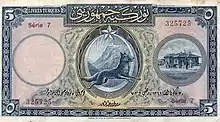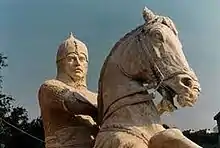Turkish nationalism
Turkish nationalism is a political ideology that promotes and glorifies the Turkish people, as either a national, ethnic, or linguistic group.
.jpg.webp)
History
After the fall of the Ottoman Empire, Mustafa Kemal Atatürk came to power. He introduced a language reform with the aim to "cleanse" the Turkish language of foreign influence.[4] He also promoted the Sun Language Theory in Turkish political and educational circles from 1935. Turkish researchers at the time like Hüseyin Cahit Yalçın and Rıfat Osman Bey also came up with the idea that Early Sumerians were proto-Turks.[5]
Variants
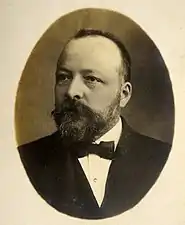
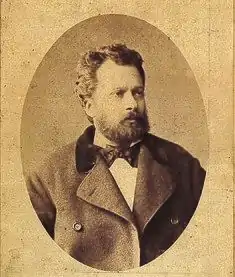
Ideologies associated with Turkish nationalism include Pan-Turkism or Turanism (a form of ethnic or racial essentialism or national mysticism), Neo-Ottomanism (with imperial ambitions derived from the Ottoman era), Anatolianism (which considers the Turkish nation as a separate entity which developed after the Seljuk conquest of Anatolia in the 11th century), and secular, civic nationalist Kemalism.[6]
Kemalism
Implemented by Atatürk, the founding ideology of the Republic of Turkey features nationalism (Turkish: milliyetçilik) as one of its six fundamental pillars.
The Kemalist revolution aimed to create a nation state from the remnants of the multi-religious and multi-ethnic Ottoman Empire. Kemalist nationalism originates from the social contract theories, especially from the principles advocated by Jean-Jacques Rousseau and his Social Contract. The Kemalist perception of social contract was effected by the dissolution of the Ottoman Empire which was perceived as a product of failure of the Ottoman "Millet" system and the ineffective Ottomanism policy. Kemalist nationalism, after experiencing the Ottoman Empire's breakdown, defined the social contract as its "highest ideal". It combines secularism, chauvinism, and a cult of personality of Atatürk.[7]
In the 1930s Kemalism became an all-encompassing state ideology based on his sayings and writings. The Kemalist definition of nationality was integrated to Article 66 of the Constitution of the Republic of Turkey. Legally, every citizen is defined as a Turk, regardless of ethnicity or religion. Turkish nationality law states that he or she can be deprived of his/her nationality only through an act of treason.[8]
Kemalist nationalism believes in the principle that the Turkish state is an indivisible whole comprising its territory and people, which is defined as the "unity of the state".
Pan-Turkism
"Turanist" nationalism began with the Turanian Society founded in 1839, followed in 1908 with the Turkish Society, which later became the Turkish Hearths[9] and eventually expanded to include ideologies such as Pan-Turanism and Pan-Turkism. The Young Turk Revolution which overthrew Sultan Abdul Hamid II, brought Turkish nationalists to power in the Ottoman Empire, eventually leading to the Three Pashas' control of the late Ottoman government.[10][11]
Anatolianism
Anatolianism (Turkish: Anadoluculuk) takes as its starting point that the main source of Turkish culture should be Anatolia (Anadolu), and the main base of this thought is that the Turkish people had built a new civilization in Anatolia after 1071 when they won at the Battle of Manzikert.
In the early Republican era, some intellectuals like Hilmi Ziya Ülken,[12] Mehmet Râif Ogan[13] and Nurettin Topçu[14] proposed that the origins of the Turkish nationalism should be sought in Anatolia, not in "Turan".[15]
Hilmi Ziya Ülken, one of the founders of Anatolianism, was opposed to Neo-Ottomanism and Pan-Islamism, as well as to Turanism. In 1919, Ülken wrote a book titled Anadolunun Bugünki Vazifeleri (Present Duties of Anatolia), but it was not published. Ülken and friends published the periodical Anadolu. They worked to form an alternative philosophy to Ottomanism, Islamism and Turanism.
State ideology from 1980
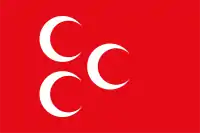
Following the 1980 Turkish coup d'état, the military dictatorship made Pan-Turkism the official state ideology.[16]
Turkish-Cypriot nationalism
Emphasizes the support for the independence of the Turkish Republic of Northern Cyprus (TRNC) and desires that the TRNC stay independent from Turkey while opposing the idea of a United Cyprus with the Greek-dominated Republic of Cyprus.[17]
Neo-Nazism and neo-fascism
A neo-Nazi group existed in 1969 in İzmir, when a group of former Republican Villagers Nation Party members (precursor party of the Nationalist Movement Party) founded the association "Nasyonal Aktivitede Zinde İnkişaf" (Vigorous Development in National Activity). The club maintained two combat units. The members wore SA uniforms and used the Hitler salute. One of the leaders (Gündüz Kapancıoğlu) was re-admitted to the Nationalist Movement Party in 1975.[18]
Today, apart from neo-fascist[19][20][21][22][23][24][25] Grey Wolves and the Turkish ultranationalist[26][27][28][29][30][31] Nationalist Movement Party, there are some neo-Nazi organizations in Turkey such as the Turkish Nazi Party[32] or the National Socialist Party of Turkey, which are mainly based on the Internet.[33][34][35]
The "Insulting Turkishness" laws
.jpg.webp)
Article 301 of the Turkish Penal Code, which is perceived as being contrary to notion of freedom of speech, states "The person who publicly denigrates the Turkish Nation, the Republic of Turkey, the Grand National Assembly of Turkey, the Government of the Republic of Turkey and the judicial organs of the State, shall be punished with imprisonment of six months to two years. But also it can be only with permission of the minister of justice"[36] However, it also states that "Expressions of thought intended to criticize shall not constitute a crime."
There have been recent indications that Turkey may repeal or modify Article 301, after the embarrassment suffered by some high-profile cases.[37] Nationalists within the judicial system, intent on derailing Turkey's full admission into the European Union, have used Article 301 to initiate trials against people like Nobel Prize–winning Turkish novelist Orhan Pamuk, the Turkish novelist Elif Shafak, and the late Hrant Dink[38] for acknowledging the existence of the Armenian Genocide.
In May 2007, a law was put into effect allowing Turkey to block websites that are deemed insulting to Atatürk.[39]
See also
Notes
- tcmb.gov.tr
- "Türkiye Cumhuriyeti Kağıt Paraları". Archived from the original on 2007-02-24. Retrieved 2007-02-24.
- "ATATÜRK VE BOZKURT". Archived from the original on 2007-01-11. Retrieved 2007-01-11.
- Landau, Jacob M. (1984). Atatürk and the Modernization of Turkey. Boulder: Westview Press. p. 133. ISBN 0865319863.
- Shay, Anthony (2002). Choreographic Politics: State Folk Dance Companies, Representation, and Power. Wesleyan University Press. p. 210. ISBN 0-8195-6521-0.
- Xypolia, Ilia (2017). British Imperialism and Turkish Nationalism in Cyprus, 1923-1939 : divide, define and rule. London: Routledge.
- https://www.nationalreview.com/corner/kemal-failed-mark-krikorian/
- https://www.universitypressscholarship.com/view/10.23943/princeton/9780691175829.001.0001/upso-9780691175829-chapter-008
- "Turkish Society". Britannica Online Encyclopedia. Retrieved 2008-07-01.
- Ayşe Hür, Mustafa Kemal ve muhalifleri (1), Radikal, February 18, 2007.
- Guy E. Métraux, International Commission for a History of the Scientific and Cultural Development of Mankind, The new Asia, New American Library, 1965, p. 73.
- https://islamansiklopedisi.org.tr/ulken-hilmi-ziya
- https://islamansiklopedisi.org.tr/ogan-mehmet-raif
- https://islamansiklopedisi.org.tr/topcu-nurettin
- Identity, Culture and Globalization - Annals of the International Institute of Sociology, ISBN 9004128735, ISBN 978-90-04-12873-6, pg. 182 - 183.
- Central Eurasian Studies Review, Vol. 3, Central Eurasian Studies Society, 2004, p. 23. Ekrem Buğra Ekinci, 16 TÜRK DEVLETİ Cumhurbaşkanlığı forsundaki 16 yıldız neyi ifade ediyor?, 2 February 2015.
- "TRNC".
- Jürgen Roth and Kamil Taylan: Die Türkei – Republik unter Wölfen. Bornheim-Merten, p. 119.
- Political Terrorism, by Alex Peter Schmid, A. J. Jongman, Michael Stohl, Transaction Publishers, 2005, p. 674
- Annual of Power and Conflict, by Institute for the Study of Conflict, National Strategy Information Center, 1982, p. 148
- The Nature of Fascism, by Roger Griffin, Routledge, 1993, p. 171
- Political Parties and Terrorist Groups, by Leonard Weinberg, Ami Pedahzur, Arie Perliger, Routledge, 2003, p. 45
- The Inner Sea: The Mediterranean and Its People, by Robert Fox, 1991, p. 260
- Martin A. Lee. "On the Trail of Turkey's Terrorist Grey Wolves". The Consortium.
- "Crime of the Century". The Weekly Standard.
- Avcı, Gamze (September 2011). "The Nationalist Movement Party's euroscepticism: party ideology meets strategy". South European Society and Politics. 16 (3): 435–447. doi:10.1080/13608746.2011.598359. S2CID 154513216. Pdf. Archived 21 May 2014 at the Wayback Machine
- Çınar, Alev; Burak Arıkan (2002). "The Nationalist Action Party: Representing the State, the Nation or the Nationalists?". In Barry Rubin; Metin Heper (eds.). Political Parties in Turkey. London: Routledge. p. 25. ISBN 978-0714652740.
- Huggler, Justin (20 April 1999). "Turkish far right on the rise". The Independent. Retrieved 21 May 2014.
- Celep, Ödül (2010). "Turkey's Radical Right and the Kurdish Issue: The MHP's Reaction to the "Democratic Opening"". Insight Turkey. 12 (2): 125–142.
- Arıkan, E. Burak (July 2002). "Turkish ultra–nationalists under review: a study of the Nationalist Action Party". Nations and Nationalism. 8 (3): 357–375. doi:10.1111/1469-8219.00055.
- Butler, Daren (21 May 2011). "Pre-election resignations rock Turkish far right". Reuters. Retrieved 21 May 2014.
- "Turkish Nazi Party". turknazipartisi.com. Archived from the original on 18 February 2014. Retrieved 7 July 2014.
- "Nazi Party Established in Turkey". sabah.com.tr. Retrieved 7 July 2014.
- "They Might Be Joking But They Grow in Numbers". hurriyet.com.tr. Retrieved 7 July 2014.
- "Neo-Nazi Circassians on Turkey". caucasusforum.org. Retrieved 7 July 2014.
- "Kanun No. 5759" (in Turkish). Turkish Grand National Assembly, official Web site. 2008-04-30. Retrieved 2008-07-01.
- "Turkey insult law 'may be dumped'". BBC News. 2005-12-28. Retrieved 2008-07-01.
- Schleifer, Yigal (2005-12-16). "Freedom-of-Expression Court Cases in Turkey Could Hamper Ankara's EU Membership Bid". Retrieved 2007-04-13.
- "Turkey adopts law to block 'insulting' websites". AFP. Turkish Daily News. 2007-05-07. Retrieved 2008-07-01.
References
- Arman, Murat Necip. "The Sources Of Banality In Transforming Turkish Nationalism". CEU Political Science Journal, issue: 02 / 2007, pp. 133–151.
- Eissenstat, Howard. "Anatolianism: The History of a Failed Metaphor of Turkish Nationalism". Paper presented at Middle East Studies Association Conference, Washington, D.C., November 2002.
- Tachau, Frank. "The Search for National Identity among the Turks". Die Welt des Islams, New Series, Vol. 8, Issue 3 (1963), pp. 165–176.]
Further reading
- Çetin, Zafer M. (October 2004). "Tales of past, present, and future: mythmaking and nationalist discourse in Turkish politics". Journal of Muslim Minority Affairs. 24 (2): 347–365. doi:10.1080/1360200042000296708. S2CID 143320570.
- Poulton, Hugh (May 1999). "The struggle for hegemony in Turkey: Turkish nationalism as a contemporary force". Journal of Southern Europe and the Balkans. 1 (1): 15–31. doi:10.1080/14613199908413984.
- Uslu, Emrullah (March 2008). "Ulusalcılık: The Neo-nationalist Resurgence in Turkey". Turkish Studies. 9 (1): 73–97. doi:10.1080/14683840701814018. S2CID 145194000.
External links
 Media related to Turkish nationalism at Wikimedia Commons
Media related to Turkish nationalism at Wikimedia Commons
